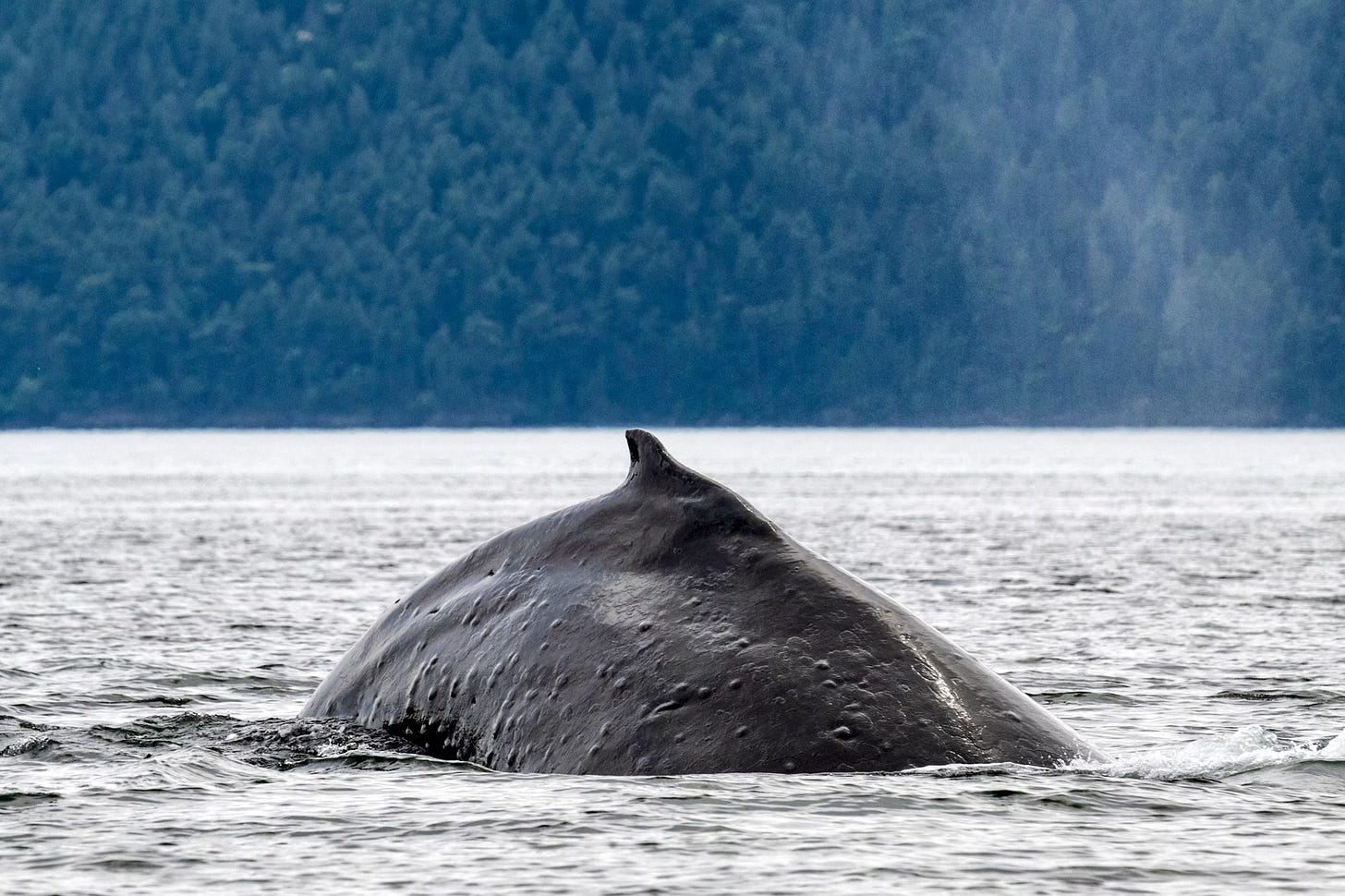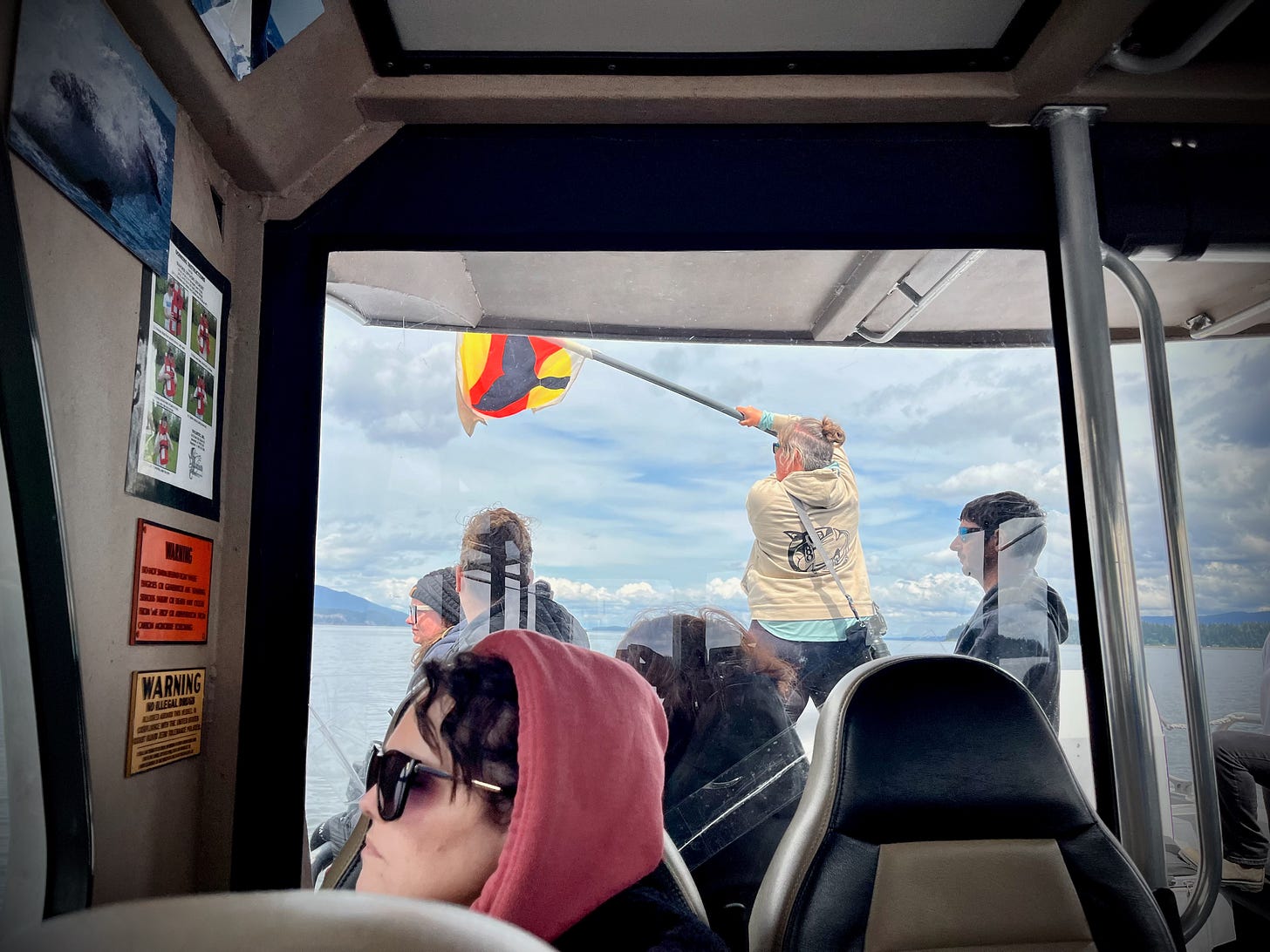Journalism is too opaque and misunderstood. Chills gives a behind-the-scenes look at how dangerous investigative journalism gets made.
The water flowed like an infinity pool as my eyes blurred in search of a puff of smoke or a telltale bump. Our Zodiac rode low to the surface of the brackish Salish Sea, beneath which, we hoped, swam whales. We knew we’d likely see orcas, but humpbacks were a possibility.
I’d seen orcas before — they live in pods around the Puget Sound — but humpbacks, what I wouldn’t have done to see one of them.
I have no real idea where this desire came from, but I have two theories.
One is “Star Trek.”
Growing up on the 1960s seasons of the series and, in the 1980s, with the first movies, I became fixated on “Star Trek IV: The Voyage Home,” the cheesy one where Kirk and the crew travel back to 1980s Earth to save the planet through utilizing the songs of humpback whales. (That briefly led to an obsession with whale song and the purchase of a rarely used cassette tape of said songs.)
But I’m not sure that’s it.
There was also the time in fifth grade when our class went to Mystic, CT, to go on a whale watch. The teachers, who were clearly not at their finest that day, gave us kids boxed lunches with red juice just before we boarded the boat. All I remember is that I was one of maybe two kids who did not barf up their red-tinged lunch that day. I got to stand on the bow of the ship and look for humpbacks. Whether I saw one or not is obscured by the memory of red barf.
So, yeah. Humpbacks have loomed large in my personal taxonomy of creatures I’ve wanted to see in life. Little did I know how it would actually feel when I finally saw one. Or, in this case, two.
After watching three orca pods for more than an hour on our Zodiac, we set off to find the much rarer humpbacks. It wouldn’t be long before our guides spotted two.
When I saw the first spray of saltwater burst into the air, something in my body melted and surged alive at the same time. When the owner of the blowhole that had released that saltwater then made its graceful, curving dive, my breath somehow tightened and left my body all at once. I have rarely felt this way, faint with desperate joy. The noises coming out of me were involuntary and better not made in public, honestly. I couldn’t help myself. This was a rush like few other things ever have been for me. It would take seven-minute intervals for us to see these massive creatures surface again, and my adrenaline was pushing its limits.
Earlier on the boat, I’d met a woman named Monika who was head of the Orca Behavior Institute, based on San Juan Island. She told me that she had decided to study orcas when she was just 12. I asked why. She said that she had seen one at that age and that that was it for her — she was in love.
When I saw those two humpbacks — one of which was known to our guides; it was named Scuba — I knew in my soul that if I had been 12 that day, I would have been like Monika. I would have led an entirely different life, one devoted to the research of humpbacks.
Instead of seeing the worst parts of some of the world’s most beautiful places, perhaps I would have witnessed great beauty.
Although I don’t kid myself. The fight to save wildlife from man is brutal and frightening. In the last 30 years, 25 orcas have died in Alaska, tangled in fishing nets, according to the National Oceanic and Atmospheric Administration. Whales are subject to the worst parts of man.
My work in journalism has also shown me the worst parts of men. It’s left me with memories of teenage girls living in collapsed buildings at the Syrian border with their belongings tacked to the wall in plastic grocery bags; with memories of old Guatemalan women recounting their rape for the first time after having lived through them in the country’s 30-year civil war; with memories of a 3-year-old girl in a hospital bed in the Democratic Republic of Congo who was rolling around in a tutu the morning after she was violated by multiple men. The only beauty I’ve seen in the course of my work in the last couple of decades has been in the background while I narrowly interrogated the violence perpetrated in such places.
The ongoing effort to study and save whales, humpbacks, is a different kind of pain, a different kind of joyful beast. I wondered aloud whether I should have taken such a path.
“It’s never too late,” my guide told me.
A few weeks ago, I discovered that a once-empty planter on my terrace was filled with thick, straight leaves. It’d been filled with dirt but sitting fallow for a year or two. I used an app on my phone called Seek, which identifies plants, to see what it was. I was blown away. My planter was filled with tulips. I repotted them to a bigger pot, and there were bulbs. Eventually, orange flowers blossomed. (My dog, Xavier, managed to decapitate the first one.)
Seattle sent me tulips. I will forever love this city for that.
I left New York City for Seattle nearly four years ago. Little speaks to why as much as this past weekend does. The simple ways you can see a landscape that is unique to the world — it’s not quite Scandinavia, nor is it New England — drew me here. The smell of pines, the grandeur of cedars. The very fact that you can travel a couple hours and see humpback whales. But it’s more than that. It’s the calm. It’s the fact that the city sends me flowers. That it sends me people who don’t ever ask what I “do,” despite it having been my defining characteristic for the last 25 years.
My anxiety has all but disappeared, living here. As a visiting friend said to me this past weekend, Seattle has given me the gift of beauty and calm. She said I am learning from the city. It’s true. After a lifetime as a New Yorker, I am learning that there is strength in not only achievement as a striver, a person who claws their way to the top, but as someone who takes deep breaths and waits seven minutes for a nearly mythical creature to surface just so I can gasp and smile and feel electrified with the beauty of the world in ways I never before knew were possible.
Chills is self-funded, without ads. If you want to be a part of this effort, of revealing how difficult reporting is made — of sending me to places like Ukraine to report for you — I hope you will consider subscribing for $50/year or $7/month.









The state obviously is a balm for your soul. The peace and comfort you get from nature is contagious. This was the most optimistic essay ever. The city sends you flowers! Who thinks this way?
And to answer your question, it’s NEVER too late to find a new passion.
oh my god; how fantastic, love the description of waiting 7 minutes, and finally seeing a humpback whale. So glad you are in Seattle. I go to Maine for 4 or so months. am looking forward to the silence, and the salt water. Thank you.